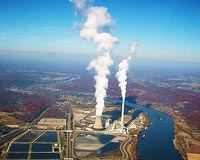| . |  |
. |
Mexico City (AFP) Nov 21, 2010 Mayors from around the world signed a voluntary pact in Mexico City on Sunday to reduce greenhouse gas emissions at a meeting meant as a precursor to next week's s UN-sponsored talks in Cancun. The gathering in one of the world's most polluted cities assembled some 3,000 local and regional leaders to discuss a wide range of economic and social issues, including climate change. Participants from some 135 cities and urban areas signed a pact committing them to adopt a slate of measures to stem climate change. The pact will be presented at next week's UN climate talks in Cancun, Mexico from November 29-December 10. Top climate scientists from around the world hope in Cancun to break the deadlock on reducing greenhouse-gas emissions and channeling aid to poor, vulnerable countries after the widely regarded failure of the last climate summit in Copenhagen. Mexico City Mayor Marcelo Ebrard and Paris Mayor Bertrand Delanoe, the current president of the United Cities and Local Governments (UCLG), opened the mayoral gathering, set to last four days. "We have to tell the international community that it's in the cities that the battle to slow global warming will be won," Ebrard said in the lead-up to the meeting. Mexico last week promised to reduce its annual greenhouse gas emissions by around 14 percent. Meanwhile, a new study released on Sunday found that fossil-fuel gases edged back less than hoped in 2009, as falls in advanced economies were largely outweighed by rises in China and India. Annual emissions of carbon dioxide (CO2) from the burning of oil, gas and coal were 30.8 billion tonnes, a retreat of only 1.3 percent in 2009 compared with 2008, a record year, they said in a letter to the journal Nature Geoscience. The global decrease was less than half that had been expected, because emerging giant economies were unaffected by the downturn that hit many large industrialized nations. In addition, they burned more coal, the biggest source of fossil-fuel carbon, while their economies struggled with a higher "carbon intensity," a measure of fuel-efficiency. Emissions of fossil-fuel gases in 2009 fell by 11.8 percent in Japan, by 6.9 percent in the United States, by 8.6 percent in Britain, by seven percent in Germany and by 8.4 percent in Russia, the paper said. In contrast, they rose by eight percent in China, the world's number one emitter of fossil-fuel CO2, which accounts for a whopping 24 percent of the total. China was followed by India, where emissions rose 6.2 percent and in South Korea, where they were up 1.4 percent.
Share This Article With Planet Earth
Related Links Climate Science News - Modeling, Mitigation Adaptation
 No letup in carbon emissions, scientists warn
No letup in carbon emissions, scientists warnParis (AFP) Nov 21, 2010 Emissions of fossil-fuel gases that stoke climate change edged back less than hoped in 2009 as falls in advanced economies were largely outweighed by rises in China and India, scientists said Sunday. For 2010, emissions are likely to resume their upward track, scaling a new peak, they warned. Annual emissions of carbon dioxide (CO2) from the burning of oil, gas and coal were 30.8 billion ... read more |
|
| The content herein, unless otherwise known to be public domain, are Copyright 1995-2010 - SpaceDaily. AFP and UPI Wire Stories are copyright Agence France-Presse and United Press International. ESA Portal Reports are copyright European Space Agency. All NASA sourced material is public domain. Additional copyrights may apply in whole or part to other bona fide parties. Advertising does not imply endorsement,agreement or approval of any opinions, statements or information provided by SpaceDaily on any Web page published or hosted by SpaceDaily. Privacy Statement |